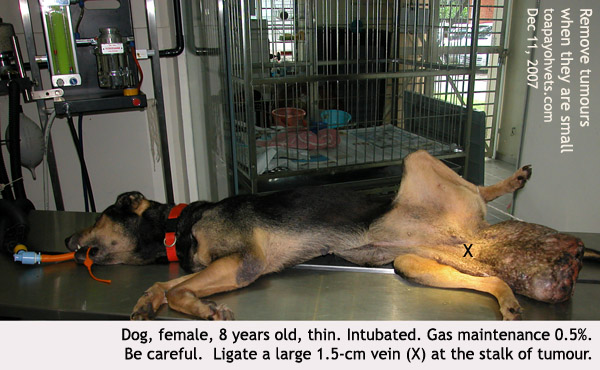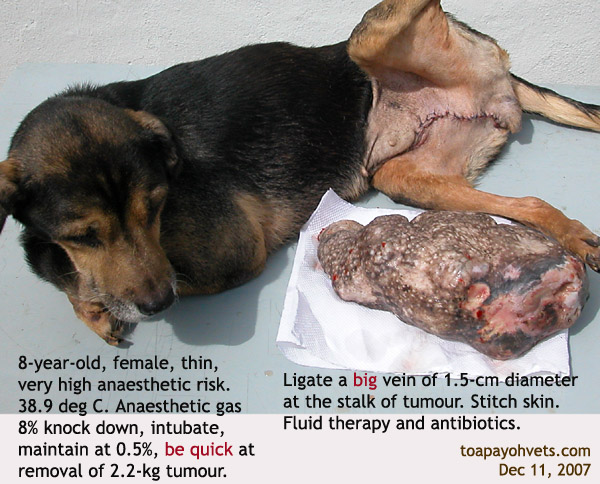The dog had not been eating for the past few days after the first consultation. The dog had been given antibiotics and the owner had not phoned me to schedule the surgery some 10 days later. The surgery and transportation of the dog would be paid by the Tzu Chi Foundation. Yet there was just absolute silence from the family.
The Singapore Tzu Chi Foundation Medical Secretary, Ms Ng had e-mailed to ask whether I had followed up on the case after the first consultation. She was the one who contacted me initially about this dog too.
I told Ms Ng that the family had to decide themselves. I could solicit the family. So, nothing happened on the owner's side. Ms Im and her volunteers numbering more than 10 had helped to bring the dog to the surgery during the first consultation. She and her volunteers contacted the owner and the dog came in for surgery in a worse condition than during the first visit. The dog could barely stand up.
"Are you sure that your over 70-year-old mother had agreed to euthanasia?" I asked. This dog was close to his mum and there was no way I could verify that all family members consented since the mum did not make it to the Surgery.
"I represent the wishes of my family," the man in his fifties was ready to sign the consent form. The Tzu Chi Foundation volunteers were shocked at his decision. Though there was a high anaesthetic risk of dying on the operating table, there was a probability that the dog might survive.
By euthanasia straight away, this dog had no chance of survival at all. One Tzu Chi volunteer, a lady in her late thirties and working for an advertising agency sat beside the dog owner and talked to him.
She talked to me. There was a surgery consent form informing the owner that he knew of the anaesthetic risks. This was a standard surgery form used in all hospitals to confirm in writing that the person had been aware of the risks. The clinical outcome of this case would be so poor that I would rather not risk my professional reputation to operate on this dog. A death of a dog spreads like wildfire to all family members and friends and all Tzu Chi Foundation members. Why take risk of ruining my hard-earned reputation over the years?

The owner agreed to the surgery after much discussion from the Tzu Chi lady. I put it on drips and operated the next day. The dog survived. The Tzu Chi volunteers prayed hard, according to the lady volunteer who spoke to the owner. Killing a life is never an option with the Buddhist volunteers. If there is a chance of survival, take the chance. Some 20 volunteers came to the Surgery to transport the dog back and forth and to see him. These volunteers are not paid by the Foundation. Their intervention save a dog from lethal injection which would have had happened.

Some 6 weeks passed. Did the dog survive after the surgery? I had not phoned the owner. If the dog survived, she could live for a few more years.
I asked Ms Im who reminded me that I had not billed the Foundation for the services. This Foundation is good at accounting and pays for services rendered.
Did the dog survive? Is she fatter? I asked Ms Ng.
Ms Ng said in her e-mail:
Follow-up on Jan 26, 2008
Hi Dr. Sing,
I heard from those who paid visit to see the dog and the owner. The dog looks good and better now. Thanks for your concern.
黄燕芯
慈济新加坡分会
电话:65829958 分机:204
This seems to be an incredible story. When the vet thinks the dog that is emaciated and weak has little chance of survival on the operating table, the dog proves the vet wrong and the owner will remind the vet of his bad prediction. When the vet thinks the dog has no problem under anaesthesia, he dies.
No comments:
Post a Comment